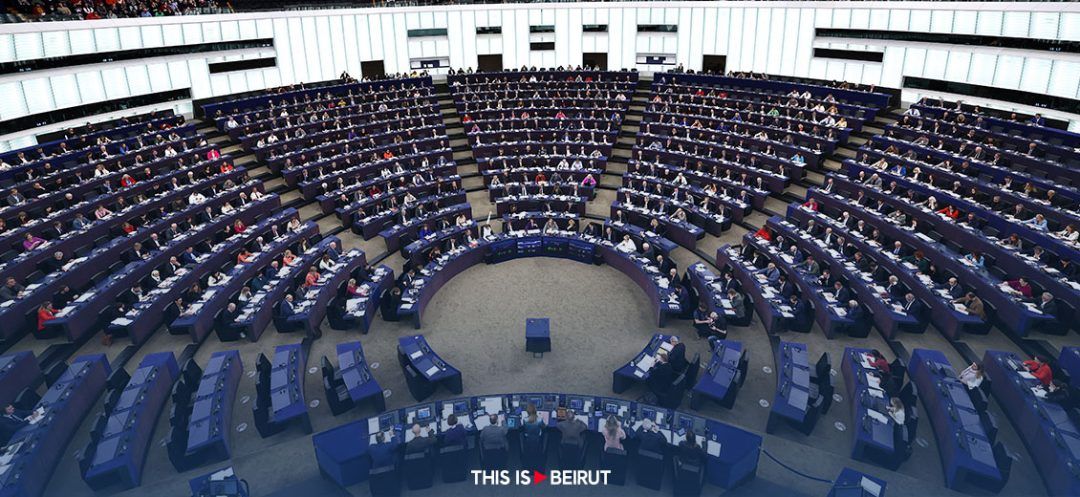- Home
- Middle East
- Upcoming EU Vote Seeks to Harden Immigration Policies

©(FREDERICK FLORIN / AFP)
The EU will vote to reform its immigration policies on Wednesday, which would harden its stance towards asylum-seekers, in a move that has been criticized by groups on both the far-left and far-right.
The EU will vote on Wednesday on a vast overhaul of its immigration policies that would notably harden entry procedures for asylum-seekers and require all the bloc's countries to share responsibility.
The overhaul was reached only after overcoming years of tensions and divisions among EU member countries. Once fully adopted, it would come into effect from 2026.
Alongside its passage, the European Union has been striking agreements with several outside countries to try to reduce the number of migrants leaving their territories with the goal of reaching Europe.
The backdrop of the two-pronged approach is a rise in asylum applications in the 27-nation EU, which last year reached 1.14 million, the highest level since 2016.
Irregular migrant entries into the bloc are also increasing, to 380,000 last year according to the EU's border and coast guard agency Frontex.
[readmore url="https://thisisbeirut.com.lb/lebanon/242862"]
NGOs and migrant charities have come out against the reform, especially its provision creating border facilities to accommodate asylum-seekers and quickly send back those deemed ineligible, which they fear will lead to systematic detentions.
The reform largely retains the basic rule in force under which the first EU country in which an asylum-seeker arrives is responsible for their case.
But it adds a "solidarity mechanism" that requires all EU countries to help front-line states such as Italy and Greece when they come under pressure by either taking in some of the asylum-seekers or providing an equivalent financial contribution.
A French centrist lawmaker in the European Parliament, Fabienne Keller, who shepherded one of the texts, called the pact "very balanced" and "a big improvement over the current situation."
"There are better checks on flows of irregular migration through the border procedures and more solidarity," she said.
But she acknowledged that it was "a hugely inflammatory topic" and criticized far-right lawmakers for "trying to panic everybody" over the changes.
The parliament's vote will not be the last step for the pact, as the technical application of its procedures still needs to be defined, Keller said. They include how to organize the border centers and supply them with sufficient resources, translators and police officers.
Another controversial point is a provision to send asylum-seekers to "safe" third countries.
A left-wing lawmaker, Raphael Glucksmann of France, said, "That would allow asylum-seekers likely to obtain asylum in an EU country to be sent to transit countries."
"That upholds the idea of a 'safe third country' which would apply to some countries that are 'safe' only by that label," he said. "It's another step towards the outsourcing of our borders."
On the far right, lawmaker Jean-Paul Garraud of France said, "The outer borders of the EU are like sieves and nothing has been done to change that."
"These mechanisms are just smokescreens," he said. "They will be ineffective and won't be able to be applied given the scale of the migration flows."
Anne-Laure Mondesert, with AFP
The EU will vote on Wednesday on a vast overhaul of its immigration policies that would notably harden entry procedures for asylum-seekers and require all the bloc's countries to share responsibility.
The overhaul was reached only after overcoming years of tensions and divisions among EU member countries. Once fully adopted, it would come into effect from 2026.
Alongside its passage, the European Union has been striking agreements with several outside countries to try to reduce the number of migrants leaving their territories with the goal of reaching Europe.
The backdrop of the two-pronged approach is a rise in asylum applications in the 27-nation EU, which last year reached 1.14 million, the highest level since 2016.
Irregular migrant entries into the bloc are also increasing, to 380,000 last year according to the EU's border and coast guard agency Frontex.
[readmore url="https://thisisbeirut.com.lb/lebanon/242862"]
NGOs and migrant charities have come out against the reform, especially its provision creating border facilities to accommodate asylum-seekers and quickly send back those deemed ineligible, which they fear will lead to systematic detentions.
The reform largely retains the basic rule in force under which the first EU country in which an asylum-seeker arrives is responsible for their case.
But it adds a "solidarity mechanism" that requires all EU countries to help front-line states such as Italy and Greece when they come under pressure by either taking in some of the asylum-seekers or providing an equivalent financial contribution.
'Inflammatory Topic'
A French centrist lawmaker in the European Parliament, Fabienne Keller, who shepherded one of the texts, called the pact "very balanced" and "a big improvement over the current situation."
"There are better checks on flows of irregular migration through the border procedures and more solidarity," she said.
But she acknowledged that it was "a hugely inflammatory topic" and criticized far-right lawmakers for "trying to panic everybody" over the changes.
The parliament's vote will not be the last step for the pact, as the technical application of its procedures still needs to be defined, Keller said. They include how to organize the border centers and supply them with sufficient resources, translators and police officers.
Another controversial point is a provision to send asylum-seekers to "safe" third countries.
A left-wing lawmaker, Raphael Glucksmann of France, said, "That would allow asylum-seekers likely to obtain asylum in an EU country to be sent to transit countries."
"That upholds the idea of a 'safe third country' which would apply to some countries that are 'safe' only by that label," he said. "It's another step towards the outsourcing of our borders."
On the far right, lawmaker Jean-Paul Garraud of France said, "The outer borders of the EU are like sieves and nothing has been done to change that."
"These mechanisms are just smokescreens," he said. "They will be ineffective and won't be able to be applied given the scale of the migration flows."
Anne-Laure Mondesert, with AFP
Read more



Comments